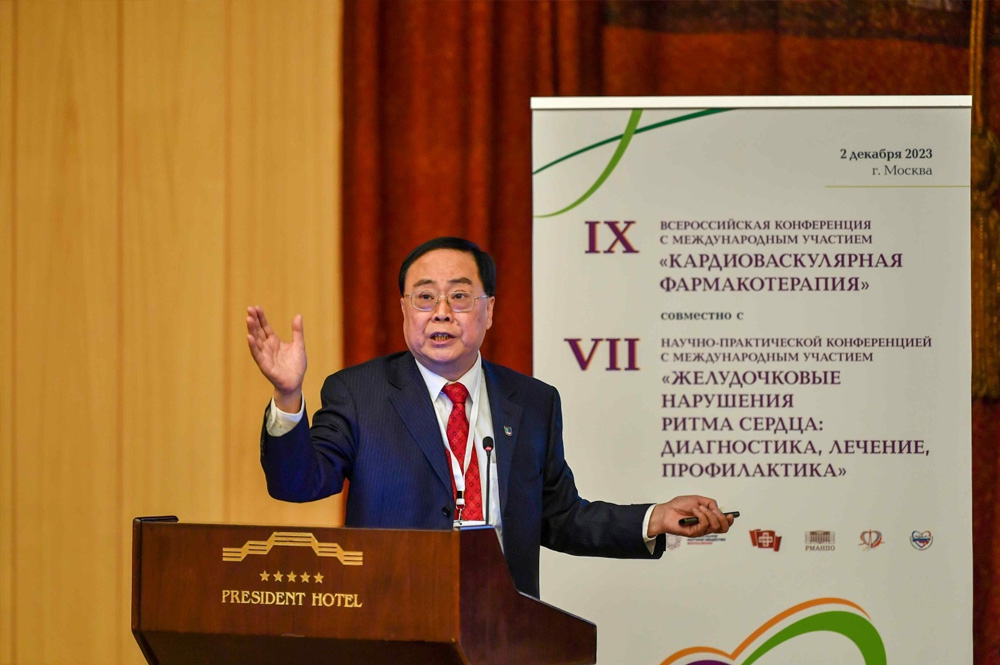Xinhua Silk Road, Moscow, December 5 (Reporter: Chen Ting, Liu Kai): As traditional Chinese medicine (TCM) continues to gain international recognition, Chinese traditional medicine and the rich cultural heritage embedded within it are increasingly winning global appreciation. Recently, at the 9th All-Russian Cardiovascular Drug Therapy Symposium held in the Russian capital, Moscow, Chinese scholars presented study findings on the treatment of cardiovascular diseases with TCM, sparking interest from the Russian medical community.

On December 2, Prof. Li Xinli delivered a presentation at the symposium held in Moscow. Photographed by Xinhua News Agency reporter Cao Yang
Prof. Li Xinli, a cardiovascular disease specialist from China and a professor at the First Affiliated Hospital with Nanjing Medical University, reported on the evaluation study of traditional Chinese medicine in the treatment of chronic heart failure during the symposium. He pointed out that heart failure is a clinically complex syndrome that poses a serious threat to life, and alleviating the socioeconomic burden caused by it has become a crucial global public health priority. Chinese medicinal formulae are among the commonly used drugs for the treatment of heart failure in clinical practice in China. Among them, Qili Qiangxin Capsules, developed based on the theory of collateral diseases, have shown clinical efficacy in the prevention and treatment of heart failure. This approach, when combined with Western medicine treatment, represents a novel option to improve the prognosis of heart failure patients.

On December 2, Prof. Li Xinli delivered a presentation at the symposium held in Moscow. Photographed by Xinhua News Agency reporter Cao Yang
Professor Li’s team conducted a large-sample, multicenter, evidence-based study, involving 3119 cases of heart failure with decreased ejection fraction from 133 clinical centers in mainland China and the Hong Kong Special Administrative Region. The randomized, double-blind, placebo-controlled clinical trial confirmed the significant clinical efficacy of the Chinese medicine Qili Qiangxin Capsules in heart failure patients. When used in conjunction with standard of care for heart failure, it further significantly reduced cardiovascular mortality and the rate of heart failure rehospitalization.
After listening to the presentation, Russian cardiologist Elena Golunova expressed confidence in the reliability of the evidence-based study results and emphasized the broad prospects for promoting TCM in Russia. She suggested that China and Russia could collaborate to conduct joint clinical study in Russian medical centers, facilitate the registration of relevant drugs in Russia, and provide a new treatment option for Russian heart failure patients.
Prof. Gregory Arabidze from Moscow State University of Medicine and Dentistry expressed his interest in the TCM approach to treating cardiovascular diseases. Traditional Russian medicine also utilizes herbal remedies, and he hoped for increased exchange between the medical communities of the two countries, allowing Russians to gain a deeper understanding of TCM and actively engage in feasibility studies of TCM treatments.
Nikita Lomagin, Chief Cardiologist at the Presidential Affairs Management of Russia, stated in an interview with reporters that the study on TCM in treating heart failure is of “revolutionary” significance. Using Western evidence-based medicine tools, it proves the effectiveness of TCM. He expressed the view that Chinese medical knowledge and experience are profound and extensive, presenting significant opportunities for medical cooperation between the two countries.
Li Xinli emphasized that in the process of promoting TCM internationally, experts from various countries have shown strong interest in the mechanisms of action of Chinese herbal medicine and the further integration of traditional Chinese and Western medicine practices. He highlighted the need for TCM to adhere to tradition while innovating, go global, and combine with modern science and technology. To achieve this, he emphasized the importance of using modern medical evaluation standards, methods, and solid research data to demonstrate the efficacy of TCM, allowing more people worldwide to understand and recognize traditional Chinese medicine.
